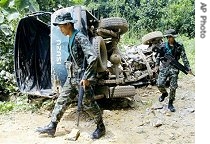2007年VOA标准英语-Thailand Government Says Secret Talks Progress(在线收听)
Bangkok
21 June 2007
The violence in Thailand's southern border provinces has escalated in recent months, the death toll rising from almost daily attacks, with schools and state officials especially targeted. The rising terror comes as the government says secret talks aimed at quelling the bloodshed have been taking place. But as Ron Corben reports from Bangkok, analysts remain fearful Muslim separatists may be about to step up the violence despite the talks.
 |
| Thai soldiers examine the wreckage of a pickup truck which was hit by a bomb while their colleagues were riding on for a morning patrol in Yala province, southern Thailand, 15 Jun 2007 |
The reports seen by VOA paint a grim picture of the rising violence - beheadings, drive-by shootings and arson attacks on both private homes and Muslim schools.
Interim Thai Prime Minister Surayud Chulanont, who last year apologized to Muslim Thais for past violence by authorities in an effort to foster reconciliation, acknowledged this week that the situation has gotten worse. Mr. Surayud insisted secret talks aimed at pacifying the region are progressing. But he offered few other details.
In the past, efforts by the government to hold talks with the separatists have failed to make headway.
The Thai representative for the U.S.-based group Human Rights Watch, Sunai Pasuk says all the evidence points to escalating violence in the south.
"The direction of violence is very disturbing," said Sunai. "There seems to be no end in the near future at all. Information and warnings that we receive from separatist militants indicated that they are committed to this killing spree without any interest in having political dialogue with the government or Thai authorities."
The Muslim-majority southern border region was an autonomous sultanate until it was annexed by mainly Buddhist Thailand more than a century ago. Separatist unrest has erupted there periodically ever since, only to subside thanks to a mixture of military action, amnesty and government support for local communities.
The latest wave of violence, which erupted in early 2004, has claimed more than 2,300 lives. Thousands of government employees, especially nurses and schoolteachers from outside the region who work in the south, are seeking to be relocated to other provinces.
Schools, with an emphasis on a Thai-language curriculum instead of one in the local Malay dialect, have been a special target of the insurgents.
Dozens of schools have been torched. Last week, nearly 100 schools in one border province were closed, many expected not to reopen after two female teachers were gunned down inside a school library as 100 children played in front of the building. The women were shot in the head, abdomen and legs. They died instantly, pools of blood staining the floors.
Human Rights Watch's Mr. Sunai says growing frustrations in the local communities may spill over into inter-communal violence.
"People in the South can take self-defense measures to the extreme," he said. "They might resort to vigilante violence in order to defend themselves from attacks. This will escalate the situation in southern Thailand from an insurgency to a communal conflict. That is one of the possible scenarios which we can foresee now."
Thai intelligence has identified two key separatist groups, the BRN Coordinate and the RKK Commando Force. It says the RKK has less than 2,000 militants spread among 200 villages and has ties to dozens of Islamic private schools led by teachers committed to a separate Muslim entity in the south.
Chulalongkorn University academic, Panitan Wattanayagorn, says the increased cooperation between various separatist groups points to the region entering a new and dangerous stage.
"We are entering into the new era, which organizations like the BRN is emerging as a front organization able to coordinate activities and sustain levels of violence despite several efforts by the Government," said Panitan. "From now on, if they can take the activities to the higher level they will be a real threat to Thai security."
Southern Thailand is one of the country's poorest regions, and many Muslims there complain of discrimination and insufficient control over their daily lives . The Surayud Government has attempted to rebuild local community trust by reconciliation, but the separatists have only responded with increased violence.